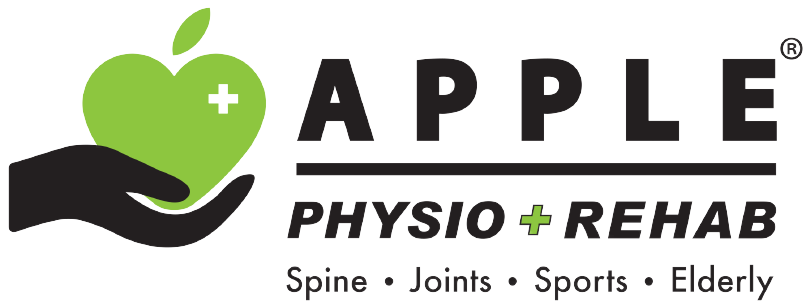Physical therapy, or physiotherapy, is a powerful tool in healthcare. It helps individuals of all ages improve their quality of life, recover from injuries, and manage chronic conditions.
Yet, many people often misunderstand the medical discipline. This has prevented them from getting its full benefits.
In conjunction with World Physical Therapy Day, Apple Physio Rehab Centre is proud to contribute to the cause and debunk common myths. This way, everyone can better understand how physiotherapy can play a vital role in long-term health and well-being.
Now then, let’s shed light on five common misconceptions about physiotherapy and uncover the truth behind them.
-
Physiotherapy Is Only for Injury Recovery ❌
Many people think that physical therapy is only needed after an injury or surgery.
This is because they often only associate physiotherapy with rehabilitation. However, this is far from the case. Physiotherapy is not just a reactive measure. It’s also a proactive approach to health and wellness.
Physiotherapy can help you:
- Prevent injuries by strengthening muscles, improving flexibility, and correcting imbalances that can lead to strains and sprains.
- Improve posture to alleviate tension from long periods of sitting or standing and lower the risk of chronic issues later in life. This is especially helpful for office workers.
- Enhance athletic performance by increasing muscle strength, flexibility, and balance. These are all essential for injury prevention and optimal performance.
All these can be done before any damage affects your body (and we certainly hope that you don’t get hurt).
For individuals with sports injuries like sprains and strains, employees with neck and back pain, or patients with chronic conditions like arthritis or fibromyalgia, a well-structured physiotherapy treatment plan remains an excellent way to manage pain and maintain mobility.
By focusing on both injury prevention and recovery, physical therapy offers a full spectrum of benefits that support overall physical health.
Bottom line: Physiotherapy isn’t just for fixing problems. It’s for preventing them too.
-
Physiotherapy Is Only for the Elderly ❌
Another myth is that physiotherapy is primarily for the old and frail.
While it’s true that humans grow weaker and become more prone to illness and injuries as we age, it doesn’t mean that physiotherapy and rehabilitation are limited to treating only the elderly.
Physical therapy is useful for people across all age groups, from children to seniors. Here’s how:
- Children
Specialised pediatric physiotherapy sessions aid children with developmental delays or motor skill challenges. These help improve balance, coordination, and strength, which are crucial for a youngster’s physical development.
- Young Athletes
Athletes in their teens and twenties use physiotherapy to recover from sports injuries, correct muscle imbalances, and prevent future injuries. Research shows that physiotherapy speeds up the healing process and reduces the chance of re-injury.
- Adults
Many adults, particularly white- and blue-collar workers, deal with physical stress from work-related postural issues. The most common culprits are neck and back pain due to prolonged sitting or heavy lifting, making back pain treatment in Malaysia a popular option to regain daily comfort and mobility.
Physiotherapy provides posture correction techniques, ergonomic advice, and targeted exercises designed to alleviate these strains and stop them from becoming chronic issues.
- Specialised Physiotherapy
Physiotherapy is even used in cardiopulmonary cases to help patients with breathing exercises and strengthen cardiovascular health. It also plays a significant role in women’s health for issues like pelvic pain caused by pregnancy or disease. Furthermore, neuro-physiotherapy supports individuals with neurological conditions like stroke or cerebral palsy.
Key takeaway: Whether you’re an active runner, a working professional, or a parent looking to support your child’s development, physiotherapy has versatile applications that adapt to each person’s unique circumstances—young and old.
| 🌐 World Physical Therapy Day: Celebrating the Impact of Physiotherapy Worldwide
Did you know that World Physical Therapy Day is celebrated globally on September 8th every year? It honours the work of physiotherapists and raises awareness about the importance of movement and rehabilitation. Started by the World Confederation for Physical Therapy (WCPT), this day promotes how physiotherapy helps people move without pain and limitations. The focus of this year’s (2024) World PT Day is low back pain and the role of physiotherapy in its management and prevention.. At Apple Physio Rehab Centre, we’re proud to contribute to this mission and clear up misconceptions so more people can benefit from physiotherapy’s unique offerings. |
-
Physiotherapy Is Painful and Uncomfortable ❌
This is among the top misconceptions that deter most people from seeking physical therapy.
Many people avoid it because they assume the process will be painful and uncomfortable. “Why should I get hurt even more when I’m already hurt?”
So is it true?
While some treatments may cause mild and temporary discomfort—especially after surgery—the main goal of physiotherapy is to relieve pain, not to cause it.
Here’s a look at how physiotherapists keep sessions manageable:
- Gentle Techniques: Methods like manual therapy, heat therapy, and low-impact stretching are used to reduce muscle stiffness gradually.
- Patient-Centred Approach: Every session is tailored to the individual’s comfort level. Pain is never the goal, and physiotherapists carefully monitor reactions to ensure a smooth process.
Research shows that gentle rehabilitation methods effectively manage pain and improve patient outcomes without causing major distress. At Apple Physio Rehab Centre, our professionally trained physiotherapists use controlled, delicate methods to ensure that treatments are manageable and adapt exercises to each patient’s pain tolerance.
The discomfort experienced in physiotherapy is typically mild and a sign that the body is adjusting and healing.
What does this mean? Physiotherapy is far from being painful. It is a path toward a pain-free life and improved mobility with scientific backing.
-
Physiotherapy Isn’t Necessary Once You Start Feeling Better
Doctors are often asked if patients can stop taking antibiotics before the end of the course because they feel better already. The answer is always a resounding NO.
Similarly, people tend to stop physiotherapy as soon as they feel a little improvement like a knee pain treatment in Malaysia. However, this can hinder full recovery and risk relapsing.
Much like antibiotics targeting harmful bacteria directly, physiotherapy addresses the root cause of your issues and not just the symptoms.
- Ensuring Full Recovery: Physiotherapy builds strength, flexibility, and balance to prevent repeat injuries.
- Addressing Underlying Causes: Pain might reduce in the early stages, but completing the full course ensures that any root issues (e.g., muscle imbalances or poor joint mechanics) are fully resolved.
Studies report that completing a full course of physiotherapy can lead to significantly better outcomes in the long run. A premature halt in treatment can mean that underlying issues remain untreated. This increases the threat of re-injury or chronic pain.
That’s why physiotherapists recommend a series of sessions and exercises to confirm that your muscles and joints have healed completely.
What you should do: Follow your physiotherapist’s guidance until the end of treatment for the best results. You want a long-lasting solution that prevents future troubles instead of a Band-Aid for recurrent aches.
-
Physiotherapy Provides Instant Results
Can you expect to get better immediately after just one or two sessions of physical therapy?
While some do experience relief after the first session, it is important to remember that physiotherapy is typically a gradual process that requires discipline, commitment, consistency, and patience. It works over time as your body adjusts.
Like regular exercise or diet changes, significant improvement can take weeks or months, depending on the condition.
Here’s what you need to know about how physiotherapy progress works:
- Slow and Steady Wins the Race
Much like building strength in a workout, muscles and joints need time to heal and strengthen. Small and constant progress leads to sustainable results.
- Consistency is Key
Skipping sessions or home exercises can delay results. Physiotherapy is most effective when patients follow through on recommended exercises and attend sessions without fail.
Regular physiotherapy sessions, combined with adherence to home exercises, deliver the best results. By being consistent with your sessions, you’re setting yourself up for a stronger, healthier body in the long run.
Get Trusted and Effective Physiotherapy at Apple Physio Rehab Centre

Positive patient review from Apple Physio Rehab Centre Puchong
Conclusion
Misconceptions about physiotherapy can hold people back from receiving effective care that would otherwise greatly improve their quality of life.
You now know to differentiate between:
| Myth | Reality |
| Physiotherapy Is Only for Injury Recovery | Physiotherapy is for both recovery and prevention, helping improve posture, manage chronic conditions, and boost athletic performance. |
| Physiotherapy Is Only for the Elderly | Physiotherapy benefits all ages, from pediatric to geriatric care, supporting a wide range of physical needs. |
| Physiotherapy Is Painful and Uncomfortable | Physiotherapy is designed to relieve pain, with methods adapted to each patient’s comfort level. |
| Physiotherapy Isn’t Necessary Once You Start Feeling Better | Completing a full physiotherapy plan ensures long-term recovery and reduces re-injury risks. |
| Physiotherapy Provides Instant Results | Physiotherapy requires consistency and time, with significant results building gradually over weeks or months. |
By understanding that physiotherapy isn’t only for injury recovery or the elderly, realising that it’s not inherently painful, and knowing that it takes dedication for the best results, you can confidently approach physiotherapy with a clear perspective.
Should you or your loved ones ever need our help, Apple Physio Rehab Centre provides the best physiotherapy and rehabilitation services in Kuala Lumpur. We provide personalised, evidence-based treatments from athletic performance support to scoliosis treatment in Malaysia.
Reach out to us today to book a consultation or learn more about how we can help you reach your wellness goals.
Your mind and body thank you.




